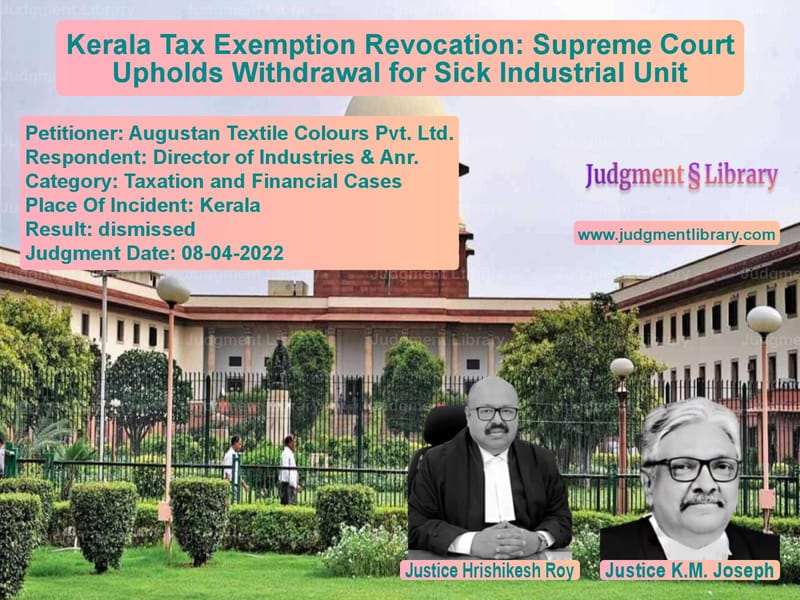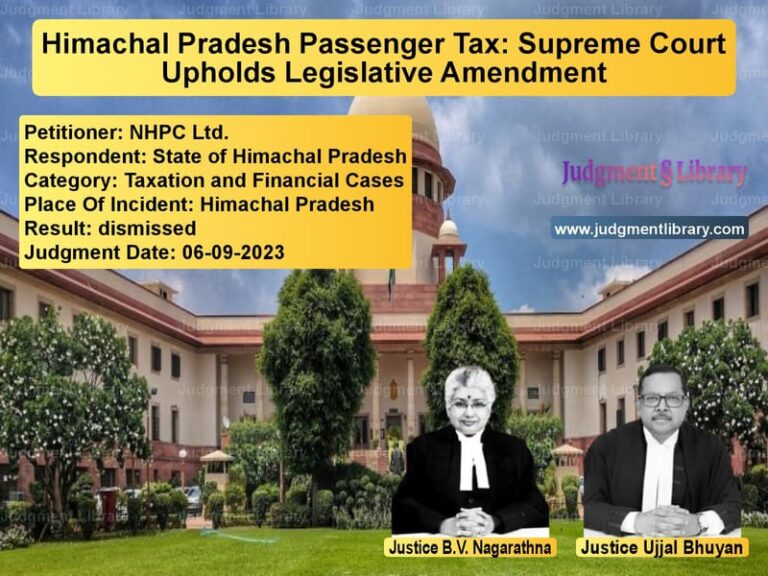Kerala Tax Exemption Revocation: Supreme Court Upholds Withdrawal for Sick Industrial Unit
The case of Augustan Textile Colours Pvt. Ltd. vs. Director of Industries & Anr. revolves around the revocation of a tax exemption previously granted to a sick industrial unit under the Sick Industrial Companies Act, 1985 (SICA). The Supreme Court analyzed whether the Kerala government’s withdrawal of the tax benefits was legally valid and if the principle of promissory estoppel could be applied against the government.
Background of the Case
The dispute began when Augustan Textile Colours Pvt. Ltd. took over a sick industrial unit, M/s Teak Tex Processing Complex Ltd., which was engaged in fabric dyeing and processing. The unit had been non-operational for an extended period, and efforts were being made to revive it under the provisions of SICA.
In 2004, the Kerala government issued an order granting several tax exemptions and concessions to facilitate the revival of the unit, including:
- Waiver of past sales tax and works contract tax arrears
- Exemption from works contract tax on fabric processing activities such as bleaching and dyeing
- Concessions related to electricity dues, water charges, pollution control fees, and local taxes
In accordance with these exemptions, the Board for Industrial and Financial Reconstruction (BIFR) approved a revival scheme for the company on January 17, 2005, reaffirming the tax reliefs granted by the Kerala government.
Government’s Withdrawal of Exemption
In November 2006, the Kerala government issued a new order withdrawing the tax exemptions, citing its authority under Section 10(3) of the Kerala General Sales Tax (KGST) Act, 1963. The government justified this withdrawal by stating that tax exemptions must be granted to a class of industries and not an individual unit.
The sequence of events was as follows:
- 2004: Tax exemptions granted to Augustan Textile Colours Pvt. Ltd.
- 2005: BIFR scheme sanctioned, incorporating the tax benefits.
- 2006: Kerala government withdrew the exemptions, arguing they were granted to a single entity rather than a class of industries.
- 2007: The withdrawal was briefly reversed, but in 2008, the government again withdrew the exemptions permanently.
- 2008: The company filed a writ petition in the Kerala High Court challenging the withdrawal.
Arguments of the Petitioner (Augustan Textile Colours Pvt. Ltd.)
- The company argued that the exemptions were granted as part of a revival package under SICA, making them legally binding on the government.
- Since the BIFR scheme had approved the tax relief, the government could not unilaterally withdraw it.
- They invoked the principle of promissory estoppel, contending that they had invested in the sick unit based on the government’s promise of tax exemptions.
- The withdrawal of the exemption mid-way into the revival process violated the company’s legitimate expectations.
Arguments of the Respondents (Kerala Government & Director of Industries)
- The government argued that tax exemptions could only be granted to a class of industries under Section 10(1) of the KGST Act, and the exemption granted to Augustan Textile Colours alone was improper.
- The withdrawal of the exemption was within the government’s powers under Section 10(3) of the KGST Act, which allows modifications to tax exemptions.
- The public interest justified the withdrawal, as other industries in the same sector were required to pay taxes.
Supreme Court’s Findings
The Supreme Court, comprising Justice Hrishikesh Roy and Justice K.M. Joseph, upheld the withdrawal of the tax exemption and made the following key observations:
1. Tax Exemption Must Be for a Class of Industries
The Court ruled that the 2004 exemption was improperly granted because it applied only to one company and not to a class of industries. The Court stated:
“Section 10(1) of the KGST Act requires that tax exemptions must be for a class of persons or goods. Since the benefit was given only to Augustan Textile Colours, it was arbitrary and legally unsustainable.”
Read also: https://judgmentlibrary.com/amalgamated-companies-and-tax-liability-supreme-courts-key-ruling/
2. Government Had the Power to Withdraw the Exemption
The Court upheld the government’s right to revoke the tax benefit under Section 10(3) of the KGST Act. It noted:
“The government retains the authority to withdraw or modify exemptions in the public interest. The withdrawal of an improperly granted exemption does not violate the principles of fairness.”
3. Promissory Estoppel Does Not Apply Against Legislative Powers
The Court rejected the company’s argument based on promissory estoppel, emphasizing that:
“The doctrine of promissory estoppel cannot be used to compel the government to act contrary to the law. Since the tax exemption was granted contrary to Section 10(1) of the KGST Act, the government was justified in withdrawing it.”
4. No Unlimited Tax Exemption Without Time Limit
The Court highlighted that the original exemption did not specify a time limit, making its indefinite continuation unreasonable. The judgment stated:
“Tax exemptions cannot be granted indefinitely without a specified time period. The withdrawal of the exemption was necessary to ensure tax uniformity.”
5. Revival Packages Must Be Within Legal Limits
The Court acknowledged that state support for sick industries is essential but held that such support must be within the legal framework. It ruled:
“The revival of a sick unit does not justify bypassing statutory tax provisions. The benefits given must align with legislative intent.”
Final Judgment
- The Supreme Court dismissed the appeal.
- It upheld the Kerala High Court’s decision affirming the government’s power to withdraw tax benefits.
- It ruled that tax exemptions granted outside statutory limits cannot be enforced.
- The government was not required to compensate the company for the withdrawn benefits.
Impact of the Judgment
This ruling has significant implications:
- Reaffirms that tax exemptions must be granted to a class of industries, not individual businesses.
- Clarifies that governments can withdraw financial incentives if they violate statutory provisions.
- Limits the application of promissory estoppel in cases where tax benefits are improperly granted.
- Ensures that revival schemes for sick units comply with the law.
Conclusion
The Supreme Court’s decision in Augustan Textile Colours Pvt. Ltd. vs. Director of Industries upholds the principle that tax exemptions must be granted within the legal framework. The ruling reinforces the government’s authority to correct administrative errors and ensures that tax policies remain equitable for all businesses.
Petitioner Name: Augustan Textile Colours Pvt. Ltd..Respondent Name: Director of Industries & Anr..Judgment By: Justice Hrishikesh Roy, Justice K.M. Joseph.Place Of Incident: Kerala.Judgment Date: 08-04-2022.
Don’t miss out on the full details! Download the complete judgment in PDF format below and gain valuable insights instantly!
Download Judgment: augustan-textile-col-vs-director-of-industri-supreme-court-of-india-judgment-dated-08-04-2022.pdf
Directly Download Judgment: Directly download this Judgment
See all petitions in Tax Refund Disputes
See all petitions in GST Law
See all petitions in Income Tax Disputes
See all petitions in Judgment by Hrishikesh Roy
See all petitions in Judgment by K.M. Joseph
See all petitions in dismissed
See all petitions in supreme court of India judgments April 2022
See all petitions in 2022 judgments
See all posts in Taxation and Financial Cases Category
See all allowed petitions in Taxation and Financial Cases Category
See all Dismissed petitions in Taxation and Financial Cases Category
See all partially allowed petitions in Taxation and Financial Cases Category







